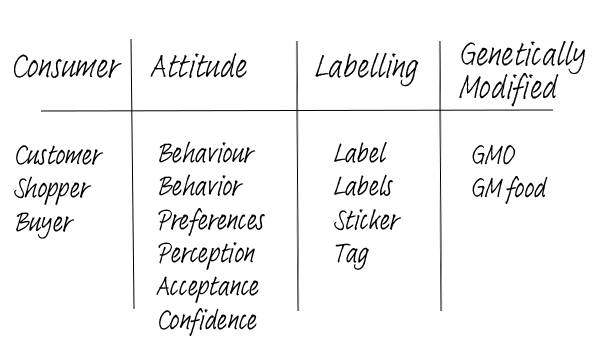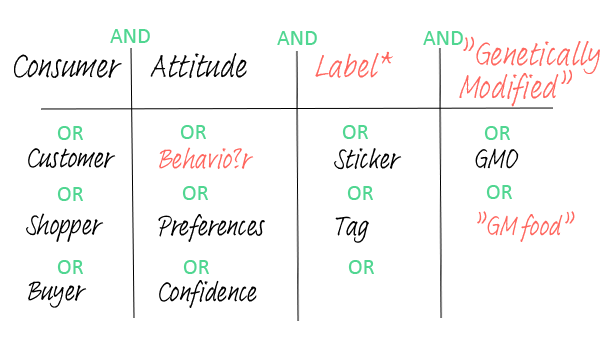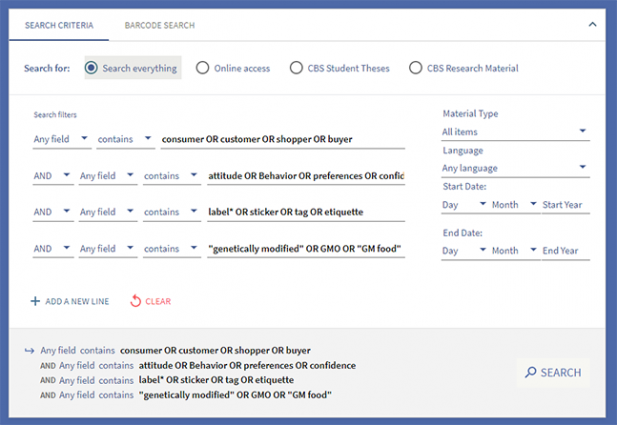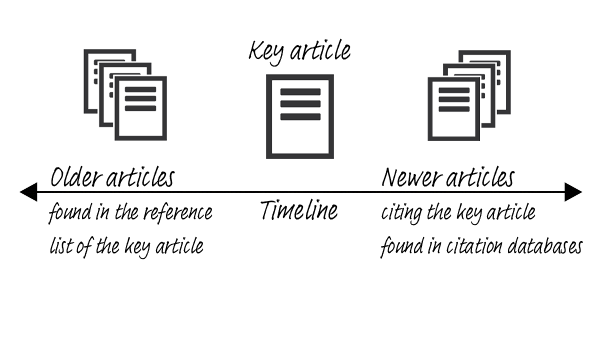Information retrieval
Plan your search
Often the day-to-day discovery of literature may happen through friends, teachers, a random Google search and so on. But once in a while, you may need to do a more thorough and systematic literature search.
Using the approaches described below may help you be more systematic.
Organize your search terms
Create a sentence that sounds like a text you would like to read. Then break it down into searchable words. Example:
Consumer attitudes toward labelling of genetically modified foods
Consider what synonyms you could also use to describe the same topic, both broader and narrower terms.
Get an overview of your words by dividing them into blocks. Have you missed some synonyms or related terms?

Combining search terms
Having made the blocks of terms, you can set up a search using the Boolean operators; AND, OR, NOT.
- Use OR within the block.
- Use AND when you want to combine two blocks to get texts containing at least one term from each block.
- Don't use NOT

Truncation and phrase searching
You can use different search features and symbols to twerk your results.
- Disguise the word endings with * or ? (example: ethnic* = ethnic, ethnicity, ethnical, ethnically)
- Mask a letter with ? (example: Behavio?r = behavior, behaviour)
- Search for phrases using quotation marks (example: "relationship marketing")
- Proximity operator (within a number of words from each other) examples: (organi* n3 strategy) (Organi* W/3 strategy)
The symbols can vary from one database to another. Consult help files in the database you are using.

Use the search words in advanced search
In Libsearch you can add all the words in different rows and combine them with Or and AND. The technique can also be used in other article databases such as Business Source Ultimate.
In this example in Libsearch the amount of hits is reduced from millions to less than 500.

Click image to see search in Libsearch
Citation Searching
Citation searching is a method that helps you find articles that have been cited by other publications. In other words, it is a way to discover who participates in the academic discussion.
Use citation searching to:
- find out if a key article has been cited by other authors
- find more recent articles on the same or similar subject
- help make your literature review more comprehensive
Try out databases for citation searching such as Scopus or Web of Science

Author stalking
When you have read a good text, it may be relevant to investigate whether the author has written other similar texts. Researchers often deal with the same subject area for many years.
Search for the name on Google and find the person's researcher profile on a university's website, where their research output is often listed.
Find search terms
- Do a mindmap/brainstorm
- Think of synonyms, use encyclopedias, dictionaries, or a thesaurus for inspiration (e.g. in Business Source Ultimate)
- Do a "quick-and-dirty" search for your topics in article databases. Scan the results for alternative keywords and phrases.
Set up user accounts in your favorite databases
Setting up accounts lets you save searches and create "alerts" or "notifications".
'Alerts' help you to keep up-to-date with the content of new journal issues or notify you when new articles that match your searches are added to a database.
Most databases have this service and it is usually called “alert”.